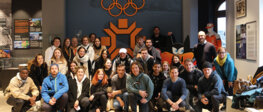Simulation Modelling(E)
level of course unit
First circle
Learning outcomes of course unit
When analytical techniques cannot be applied because of problem complexity and obtaining solutions from experiments is not feasible (to expensive, dangerous, etc.), simulation models are a powerful, universal tool for decision support, e.g. in the context of business processes, production systems, etc. Fundamental methods and techniques of modeling and simulation will be understood and can be applied using selected software tools.
prerequisites and co-requisites
Basic Math and Statistics knowledge
course contents
Each course unites is divided in a know-how and a practical part. In the more theoretically oriented know-how part, the fundamental methods and techniques of modeling and simulation (model building processes, modeling paradigms, simulation software, input data modeling, verification and validation of simulation models, output data analysis, and comparison of variants) are taught. In the practical parts the focus is on practicing the use of a commercial simulation software tool (presumably “SImul8”). Additional labs in the context of input modeling, validation, a model building tutorial, and a small project round up the practical part.
recommended or required reading
• J. Banks et al. Discrete-Event System Simulation. Pearson Education/Prentice Hall, Upper Saddle River, 2001.
• Simul8 Corporation. Simul8 Manual and Simulation Guide. Simul8 Corporation, 2002
assessment methods and criteria
Homework & examples: 50%, Simulation project: 50%
language of instruction
English
number of ECTS credits allocated
3
eLearning quota in percent
0
course-hours-per-week (chw)
2
planned learning activities and teaching methods
Lectures, discussion, examples, reading assignments, small project, Support via e-Learning-platform “Moodle” (learn.fh-kufstein.eu)
semester/trimester when the course unit is delivered
2
name of lecturer(s)
Prof. (FH) Dr. Johannes Lüthi
year of study
/
recommended optional program components
non
course unit code
IP_TEC100
type of course unit
integrated lecture
mode of delivery
Compulsory
work placement(s)
Not applicable.



